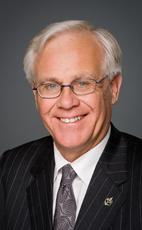Mr. Chair, I would just like to say at the outset that I will be splitting my time with the hon. member for Souris—Moose Mountain.
I welcome the opportunity to rise today to participate in this significant and timely debate. As members know, Canada has led the international outcry against the conviction last week of former prime minister Yulia Tymoshenko. Following the news of her conviction, the Minister of Foreign Affairs issued a very strong statement expressing Canada's concern over the ways in which the arrest, prosecution and conviction of Yulia Tymoshenko were carried out by Ukrainian authorities.
In August, when Ms. Tymoshenko was first arrested, our government stressed that the appearance of political bias in judicial proceedings undermines the rule of law and urged the Ukrainian government to strengthen judiciary independence. In September, both the Prime Minister and the Minister of Foreign Affairs wrote to Ukrainian President Yanukovych, again expressing Canada's concern about the process and the appearance of political motivations in judicial proceedings.
Canada is not alone in expressing this dismay. Both the European Union and the United States, for example, have condemned the trial and conviction, speaking of the selective application of justice in politically motivated prosecutions. We owe it to the more than 1.2 million Ukrainian Canadians, who have done so much to help build this country of ours, to make it as clear as we possibly can to Ukrainian authorities that they must respect the fundamentals of human rights and the rule of law.
The terrible irony of this is that President Yanukovych came to power in 2010 in a presidential election recognized as free and fair. This was a real milestone in Ukraine's democratic development. Yet here we find the actions of this administration working to subvert the very institutions that brought it to power.
A double irony is that more than 300 Canadians participated in that electoral process as election observers, in a contribution to Ukraine's democratic development that we have been making since 2004. Our support for the development of democratic institutions in Ukraine is but one example of what Canada and Canadians have done to help build a democratic Ukraine following its independence in 1991. After 70 years of Soviet rule, there was certainly a lot of building to do on the democratic front. To speak of a democratic deficit after all that time is putting it very mildly, to say the least.
What had to be built was not just the institutions and the processes, but all the checks and balances that we take for granted here in Canada, all those instruments that ensure the people's will is respected. What had to be built was a belief in democracy, the belief that people's voices could matter, that “a government must work in the interests of its people, not the other way around”, as the Prime Minister said last year when he was in Ukraine. Such reconstruction takes a long time.
The Orange Revolution of 2004 was one of the first bold and courageous realizations of this power of the people in newly independent Ukraine. Expressing their anger at the political corruption they believed had tainted the presidential elections, Ukrainians in the thousands took to the streets and remained there until those results were tossed out and the election was re-held. We heard from some impassioned speakers earlier this evening who were actually there at that time, and we heard about the reactions of the people of Ukraine to that very important Orange Revolution.
While many of the promises of the Orange Revolution were not met in the years that followed, there was democratic progress with the increased media and political freedoms. It is those fought-for freedoms that are now once again under attack, and the Tymoshenko case is but one of many. More than 12 members and senior officials of the previous government have been detained in criminal probes. In addition to Mrs. Tymoshenko, one former minister has been jailed and another has fled and successfully claimed political asylum in the Czech Republic.
I am confident that such bullying will not win the day. We must continue to urge the Ukrainian government to strengthen judicial independence and to support efforts to build a peaceful, democratic and prosperous society in Ukraine, because our ties with the Ukrainian people are significant.
Who can forget the generosity of the Ukrainian-Canadian community in 1991, which largely covered the cost of the opening of the Ukrainian embassy in Ottawa following its independence? That generosity and principled support is reflected in the support we have provided Ukraine since its independence in 1991.
This support has been provided on all fronts: through aid, and Canada is the fourth-largest donor of bilateral assistance to Ukraine; through military training co-operation programs; and through assistance in helping to reduce the trafficking of nuclear and radiological materials, which are a dark legacy of the Soviet era.
These political show trials designed to intimidate and destroy democratic voices of opposition must come to an end. If the Ukrainian government is serious about tackling corruption, as it claims, then it needs to do so through a transparent process that respects international standards and is clearly and genuinely independent.
As has been pointed out by many commentators, Tymoshenko went on trial for establishing legally binding agreements, the legality of which have not been contested. Making criminal that which is perceived to be a bad or incorrect decision by an elected official, which would seem to be the case in the Tymoshenko trial, is obviously denying the true source of authority—

